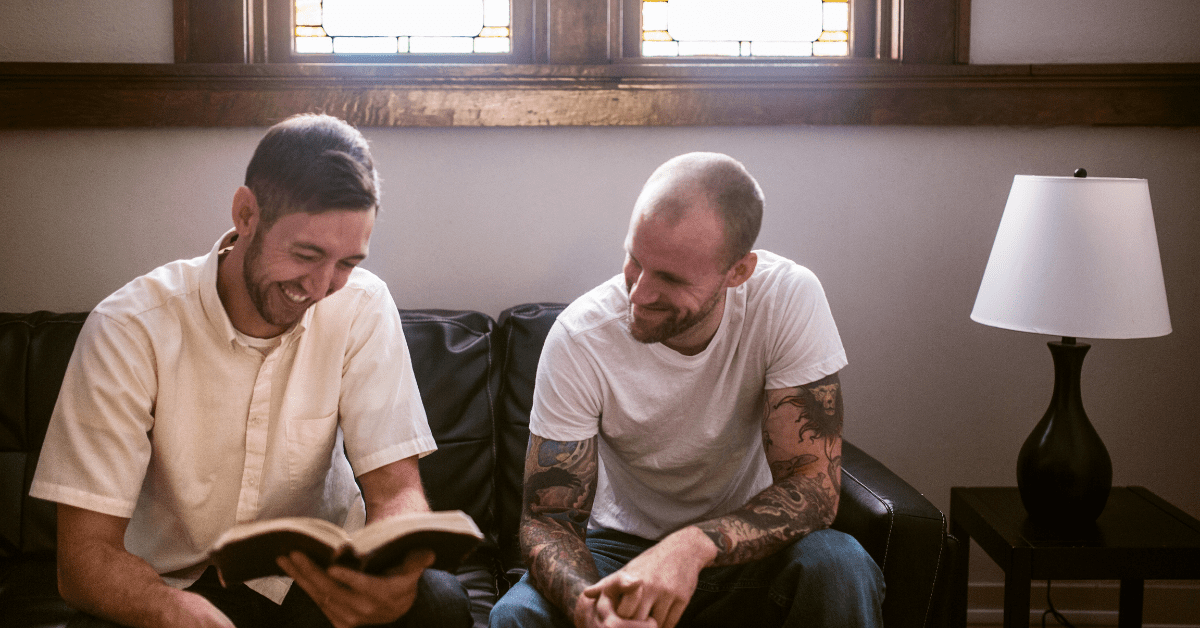Darin is a church planter and the pastor of NoHo Community in North Hollywood, California. His story began in the Atlanta suburbs, where he was raised in a nondenominational church. He went to school in Atlanta and worked at another nondenominational church in the area but was fired for being bisexual. Darrin moved to California to finish his masters in theology at Fuller Seminary.
During that time he began to be involved with a church called New Abbey in Pasadena. He described them as evangelical-ish. Most of their 300 members are people who came from or out of various Evangelical traditions. The founding pastor asked Darrin if he would be interested in church planting. That church plant became New Abbey North Hollywood, now NoHo Community.
NoHo Community had their first gathering and worship in late 2020 with about 40-50 people becoming part of the community. Darin estimates that the community is 70-75% queer, slight majority white, more heavily female, with a significant population of people who identify as agnostic, atheist, and witches—possibly around 50%. Most of this group has left evangelical spaces.
The Bible as a bridge
With such a diverse community, Darin seeks to keep conversations centered around Jesus and create a space for everyone to question, grow, and explore. “Lots of people are just processing trauma with the Bible…NoHo Community is a Jesus-centered community that is pursuing healing, growth, and transformation in ourselves and in the world around us.” A lot of people like exploring faith and spirituality but are not interested in the predetermined conclusions that typical churches may force people into. They want to know if religion can ever be healthy.
NoHo Community is focused on building relationships and getting to know the whole community in order to create safe spaces for dialogue. Darin said that there is a lot of interest in exploring the Bible and talking about the Bible even though many in the community are agnostic or atheist. “A lot of people are interested solely because they want to have better conversations with their parents. It’s an important queer framework. Queer Christians have to defend their identity all the time.” Studying the Bible, then, becomes a bridge to their families. Others have joined the community because they might have grown up in a church, and they want to see a church that they would want to go to.
Focus on relationships
As a very relational space, they focus on checking in on each other, eating dinners, and helping out with the community’s needs, like supporting rent. “We’d rather go broke on generosity than another reason.” Darin also added that this approach has been very appealing to queer people who may have lost their families in their journey.
Darin said that it is not difficult for him to share Jesus in the community even with a lot of non-Christians, because he is very open and explicit with the fact that he centers his life around Jesus. “Everyone knows it is a Jesus community and expects it…I don’t need to change your mind about anything. I just want to have good conversations, and I want us all to figure out how to heal and grow.” In regards to Jesus’ own life and ministry he added, “It doesn’t seem like getting people to change their minds about who Jesus was, was as important as upending these marginalizing structures that existed in the socio-religious fabric of society.”
A typical gathering always starts late because of the intentional time built in for relationship building. Darin said that when they were meeting in person they would begin with “the most LA thing ever,” grapes and LaCroix. They would start the service with a prayer for unity, justice, and being made in the image of God. They would have a few worship songs. Then they would always do check-ins for people to share what is going on in their lives, paying special attention to if they need prayer, support, or celebration.
Next, they have announcements and a time Darin calls “Meet an Interesting Person.” He wants to make sure that people know the pastor is not the most important person in the room, so a community member or someone from the outside will share about themselves. Then the sermon always begins and ends in small group time, answering questions. Afterwards they move into another song and communion. Darin said they haven’t done communion since the pandemic hit, but before they would have a new person introduce communion every week. Finally a last song and a blessing. Currently over Zoom they try to keep the same format, because the relationality of their gatherings is extremely important.
Darin feels that being the pastor of NoHo Community North Hollywood is the culmination of his actual life experiences. He often found himself in spaces and with people who were atheist, gay, or hurt by the church. He also felt like he was caught in secular spaces that were maybe against church, but now he gets to talk about the things he would normally talk about. Now he doesn’t feel like he’s doing two separate things, but one thing. “People are learning the story of Jesus is much more nuanced than they were taught and we are leading them to questions they’ve always wanted to ask.”
Prayer
Holy God, we give thanks for the community being built by NoHo Community. Bless them with your love and presence in their midst. We pray for all who have been hurt by the Church, that they would know your love. We pray they will find communities and safe spaces to ask the questions they’ve always wanted to ask. We pray for a more open and welcoming Church that sees the image of God in everyone. Amen.



